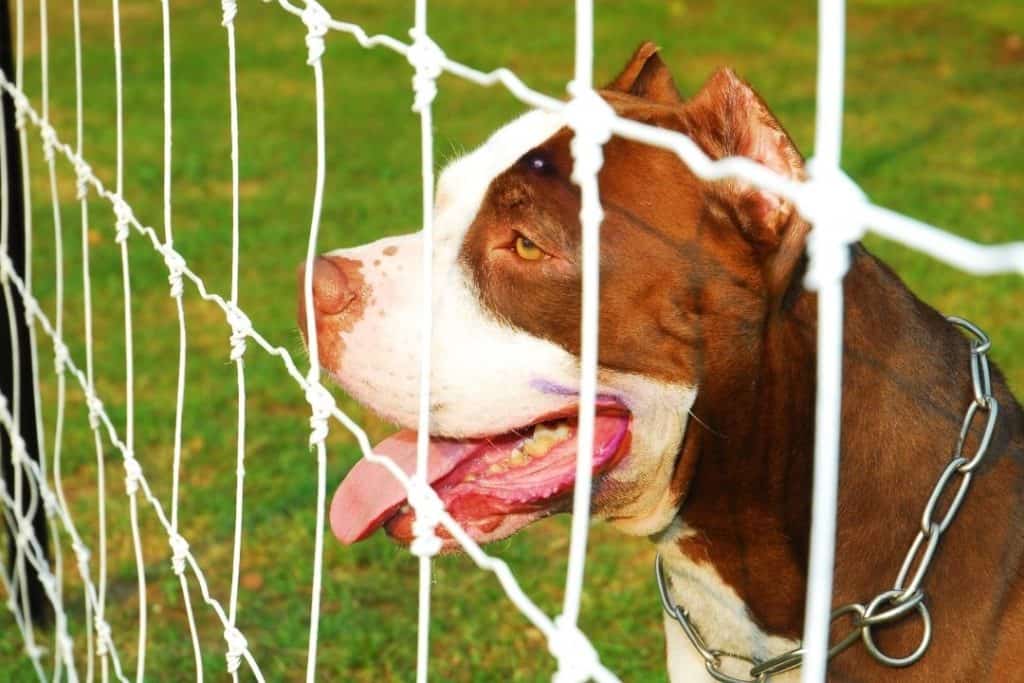This article may contain affiliate links, and I will be compensated if you make a purchase after clicking on my links (at no additional cost to you)
Barking is a natural instinct for dogs, as it’s one of their many forms of communication. All breeds of domestic dogs bark at some point, and the American Pit Bull Terrier is no exception — but are American Pit Bull Terriers excessive barkers?
American Pit Bull Terriers bark a moderate amount, although they do not generally bark without reason. You can expect barking from this breed when they feel alert, protective, bored, provoked, scared, excited, or threatened.
Of course, each American Pit Bull Terrier is different — every dog has its own unique personality. Some may be more vocal, whereas others are largely silent.
In this article, I’ll cover why dogs bark, the barking habits of American Pit Bull Terriers, and when they tend to bark, as well as provide some tips on how to train your pitbull to stop barking incessantly. Read on to learn more.
Why Do American Pit Bull Terriers Bark?
Adult wolves rarely bark — so why do dogs bark if they’re descended from wolves? The answer has a lot to do with domestication.
American Pit Bull Terriers and other domestic dogs bark due to neoteny — physical traits of childhood in adulthood. Wolf pups bark, yap, and make other vocalizations, whereas adult wolves hardly bark at all. During domestication, dogs retained many infant wolf behaviors, including barking.
Therefore, if you find that your American Pit Bull Terrier is a barker, you can attribute this to the domestication of dogs which began thousands of years ago.
Canine Communication
Dogs, including the American Pit Bull Terrier, have several forms of communication, from body language to scent, as well as dozens of vocalizations, including:
- Barks
- Whines
- Yaps
- Growls
While you may consider barks to be a rather simple form of canine communication, there is actually a wide range of barks that have different meanings. The pitch, number of barks, and pauses between barks each tell a different story about what a dog feels.
So, the next time your American Pit Bull Terrier starts vocalizing, pay attention to how it sounds.
- High-Pitched Barks – If your American Pit Bull Terrier is feeling lonely, it may produce a high-pitched bark that sounds similar to a yelp. Some dogs, however, also produce high-pitched barks when they’re feeling playful or excited. You might notice these types of barks when you first arrive home from work, or when he sees his leash and becomes excited about a walk.
- Low-Pitched Barks – Typically, the deeper a dog’s bark, the more serious the dog is. If he feels fearful, aggressive, or just wants to be left alone, you’ll notice that the pitch of the vocalization is much lower than it is when he’s happy, excited, or feeling playful.
- Constant Barking – A continuous, nonstop bark shows that a dog is highly attentive to something, whether it be an animal, human, or anything that the dog deems curious. Your American Pit Bull Terrier likely wants to signal or warn you that someone or something is around.
- Pauses Between Barking – If you notice your American Pit Bull Terrier regularly barking, although with pauses in between, it may be feeling worried or excited. Look at the dog’s body language as a whole to determine what it’s feeling.
- Single Loud Bark – A single loud bark is a cause for concern, and you should react immediately. This usually indicates that your American Pit Bull Terrier feels surprised, threatened, or even annoyed. The dog may be telling someone or something that it wants to be left alone. A bark, in this instance, is the first line of defense, so remove the dog from the situation as soon as possible.
- Multiple Barks – The more barks, the more aggressive your canine is feeling. If that’s the case with your American Pit Bull Terrier, make sure to check and see what’s bothering him. It could be something dangerous, such as a snake, or it might just be something your dog isn’t familiar with, such as a bag stuck to a tree blowing in the wind.
Interestingly, humans — even those who aren’t dog owners — can classify dog barks and determine which mood the dog was feeling. They were able to choose possible situations that the dog was barking about and could match the situation with accuracy far higher than chance. This could be due to our close relationship with canines for thousands of years.
Are American Pit Bull Terriers Barkers?

Like all domestic dogs, the American Pit Bull Terriers do bark, but they’re not considered incessant barkers like other terrier breeds.
The American Pit Bull Terrier is a moderate barker — so, yes, the breed does bark, especially if it feels the need to. This breed, however, is not the type that barks all day long for nothing, but there are always exceptions to that rule.
When Do American Pit Bull Terriers Bark?
As mentioned in the first section, American Pit Bull Terriers, as well as other dogs, bark for a multitude of reasons — and each bark may have a different sound based on what the dog is feeling at the time.
American Pit Bull Terriers bark for many reasons, including when they feel protective, bored, provoked, excited, or threatened. Any sight, sound, or smell can arouse your American Pit Bull Terrier, giving them a reason to bark.
Protective Barks
The American Pit Bull Terrier is naturally loyal, protective, and intimidating.
Their owner and family members are, to them, part of their “pack,” thus these dogs are willing to protect them at all costs. Therefore, if your American Pit Bull Terrier feels as though there’s a threat nearby — whether it’s someone at the door or a stranger in your yard — they will bark to alert you of potential danger.
Boredom Barks

Full of energy, the American Pit Bull Terrier needs regular mental and physical stimulation. If they’re feeling bored, they tend to find themselves in inappropriate situations, such as chewing, running wild through the house, or barking incessantly. This is usually due to boredom.
As the owner of an American Pit Bull Terrier, it is your responsibility to ensure that these high-energy dogs have ways to stay occupied, especially when you’re not home.
Provide the dog with plenty of chew toys, puzzle treat dispensers, and keep the blinds and curtains closed to prevent him from barking at everyone and everything that passes by.
I recommend the AWOOF Pet Snuffle Mat from Amazon.com. This interactive toy allows you to hide small toys, treats, or other objects inside, giving your dog the chance to sniff them out.
It’s an excellent way to stimulate your American Pit Bull Terrier’s mind while also training their sense of smell.
Provocation Barks
If you’re the owner of an American Pit Bull Terrier, you know first-hand just how powerful these creatures are. Therefore, it’s important to know when your dog feels that it’s reached its limit with people or other animals.
Feeling teased, harassed, or provoked could lead to a potentially dangerous situation. To warn the provoker, these dogs may bark — and it’s usually a thunderous, deliberate, single bark — to say “Stop!”
Humans are similar, as we sometimes express our frustrations through yelling, especially when someone continues to bother us even after we’ve attempted to walk away. Dogs do the same. When dogs “yell” at another dog or human, it’s very obvious what they mean — and it’s wise to listen. As long as the source of the annoyance goes away, there’s not much more intervention that needs to take place.
It’s important to note that while the American Pit Bull Terrier tends to be friendly with humans (when well-socialized), they may be averse to other animals due to their history. So, if your dog is signaling you that another animal is bothering him, remove him from the situation.
Excited, Playful Barks
You may notice your American Pit Bull Terrier vocalizing with high-pitched, “happy” barks whenever it’s feeling excited or playful.
It could be a bark when you throw a ball during a game of fetch, a bark as soon as you arrive home from work, or even a bark when they see a canine friend or person that they haven’t seen in a while.
Threatened
American Pit Bull Terriers are not the kind of dog that backs down from a threat — they’re willful, determined creatures and are often fearless. They know what they’re capable of, and when it comes to protecting those that they love, they won’t hold back.
Therefore, if your American Pit Bull Terrier feels threatened, it will let you know without hesitation.
It could be a stranger or animal that comes too close to you while you’re out on a walk, or the mail-person as they approach your home. This is a protective breed, so it only makes sense that they’ll warn you of potential danger with loud barking.
Is My American Pit Bull Terrier Barking Too Much?
An American Pit Bull Terrier is barking too much if it barks constantly, for no reason at all — but pay attention to your pet. Some bark when they feel protective, bored, provoked, playful, or threatened, which are acceptable situations in which to bark. If your dog barks too much, see a vet first.
Once you’ve determined that your American Pit Bull Terrier’s barking isn’t caused by a medical condition or something bothering the dog, then it’s time to start training your dog not to vocalize unless there’s a real threat.
Training an American Pit Bull Terrier Not To Bark
American Pit Bull Terriers are incredibly loyal and always eager to please. Fortunately, that makes it relatively easy to teach them new tricks.
Of course, you want your American Pit Bull Terrier to bark when it’s necessary — you just don’t want constant, incessant barking all hours of the day and night. That’s where training comes in.
Stop an American Pit Bull Terrier from Barking
There are several ways to stop an American Pit Bull Terrier from barking. We’ll outline the following ways in more detail below:
Socialization
Due to their history as a dogfighting, bull-baiting breed, American Pit Bull Terriers tend to be less tolerant of other animals. As such, it’s critical to socialize these dogs with other animals and people from a young age. When they’re used to other creatures, they’re less likely to bark constantly when they encounter new people or animals.
Training
Training is an absolute must with any domestic dog, and it can help stop a dog’s incessant barking. The American Pit Bull Terrier is a strong, muscular dog with immense power. Therefore, it’s irresponsible to allow this dog to rule the roost — you should be in charge at all times. Basic obedience training is a must.
Keep The Dog Occupied
Keeping your American Pit Bull Terrier occupied is another way to reduce incessant barking. By offering your dog plenty of mental and physical stimulation through hikes, daily walks, games of fetch and tug-of-war, or puzzle feeders, you can help them expel some of that excess energy.
Positive Reinforcement
When training your American Pit Bull Terrier not to bark, don’t punish them when they vocalize. Instead, ignore them. When they’re quiet, you can provide them with treats, love, and praise — as to say, “You’re being quiet! Good work!” By punishing them for barking, you’re still giving them attention — negative attention, but attention nonetheless. This doesn’t help the dog learn.
Eventually, positive reinforcement for not barking will encourage your dog to make the connection, associating barking cessation with a reward. You can also reward your dog for barking but only when the dog barks on command.
Conclusion
As with all domestic dog breeds, the American Pit Bull Terrier is capable of barking, and it will do so when it feels the need. Compared to other dog breeds (such as the Beagle), however, the American Pit Bull Terrier only barks a moderate amount, on average.
If you find that your dog barks excessively, or at things that don’t matter, then it’s important to have them checked out by a vet. Once you’ve ruled out medical conditions, consider training your American Pit Bull Terrier to reduce incessant barking.

I created this blog to share my passion for bullies, and help current and future pitbull owners with things like diet and education.
Hope you find it useful, don’t hesitate to drop a comment on my articles!



